人教版八年级英语下册Unit 9 Have you ever been to a museum? Section A Grammar Focus(共37张PPT)
文档属性
| 名称 | 人教版八年级英语下册Unit 9 Have you ever been to a museum? Section A Grammar Focus(共37张PPT) | 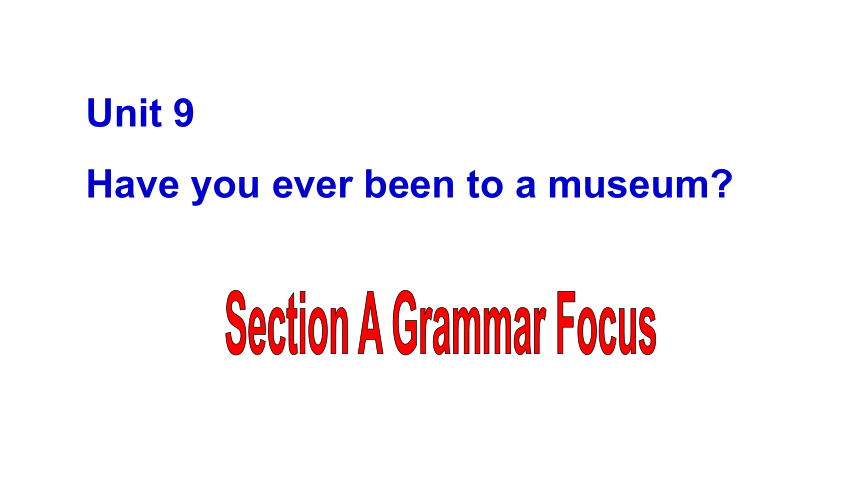 | |
| 格式 | zip | ||
| 文件大小 | 1.8MB | ||
| 资源类型 | 教案 | ||
| 版本资源 | 人教新目标(Go for it)版 | ||
| 科目 | 英语 | ||
| 更新时间 | 2019-05-28 18:38:25 | ||
图片预览

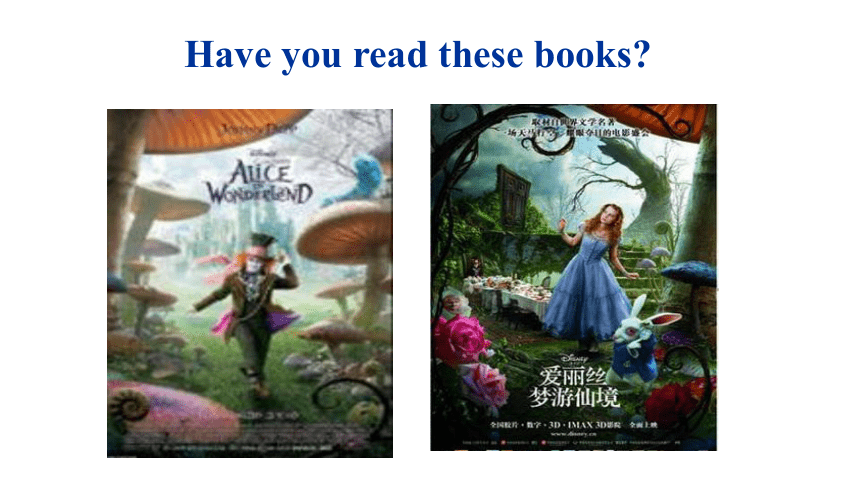
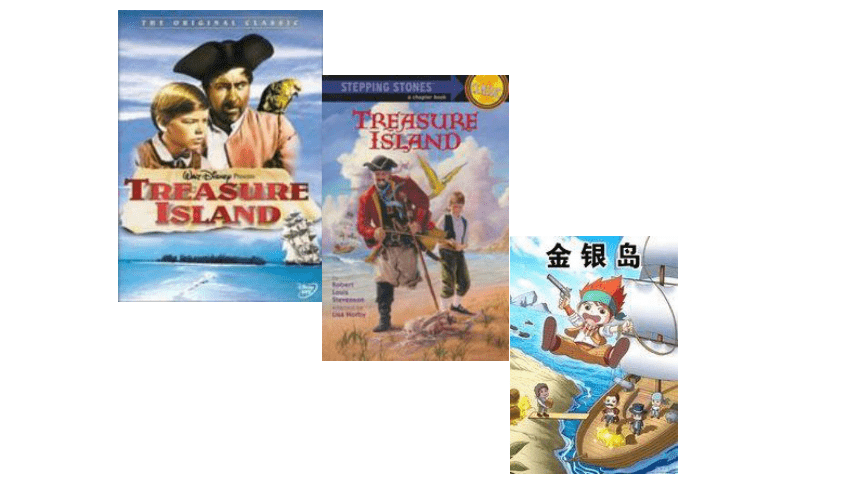



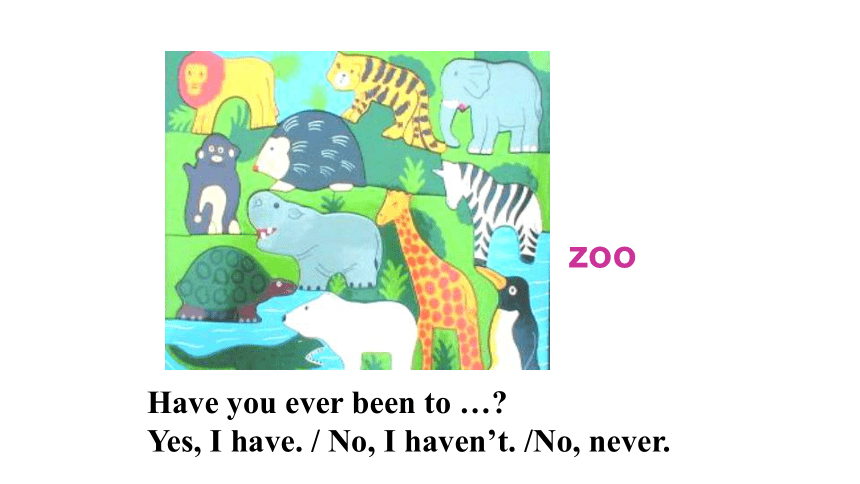
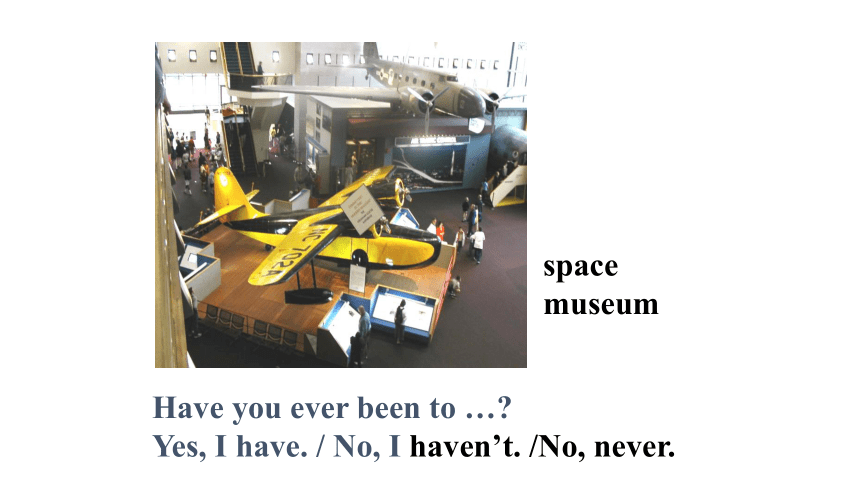
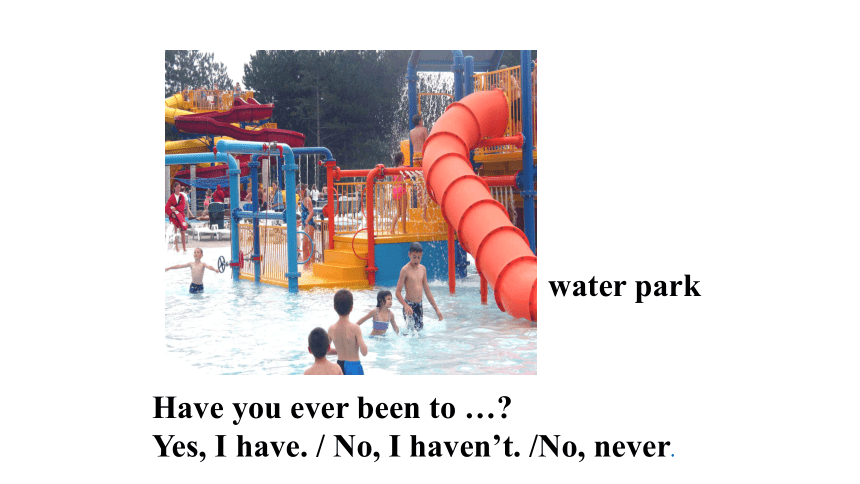
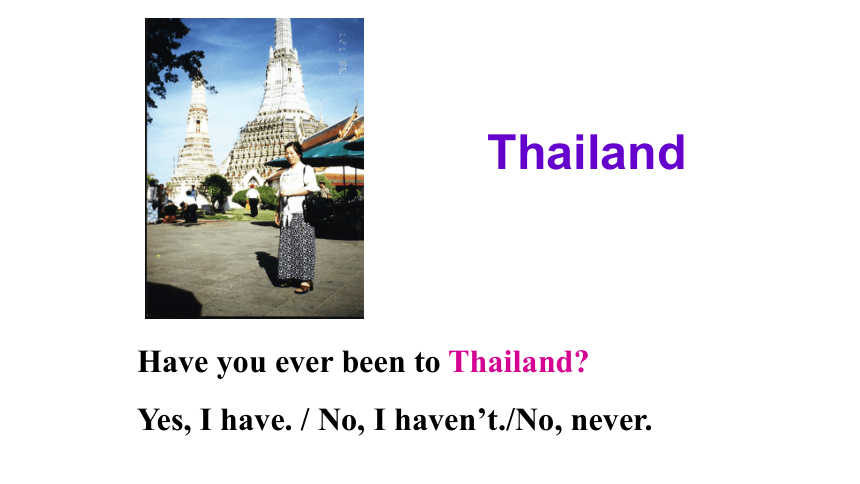
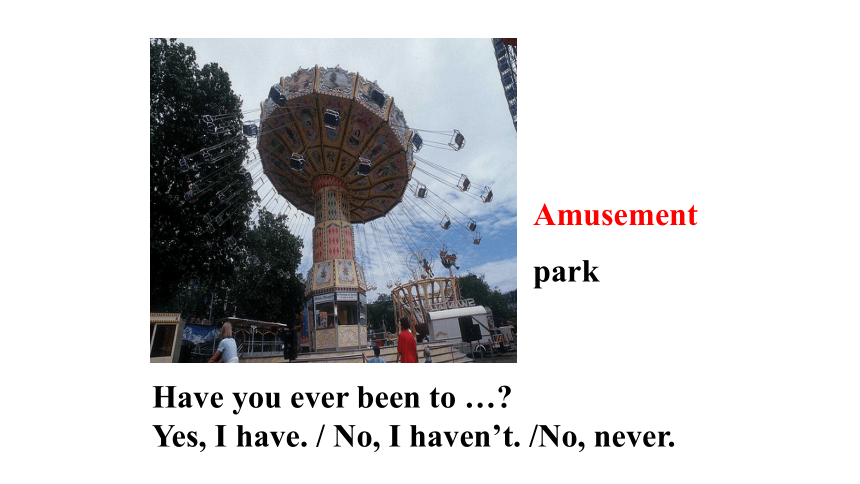
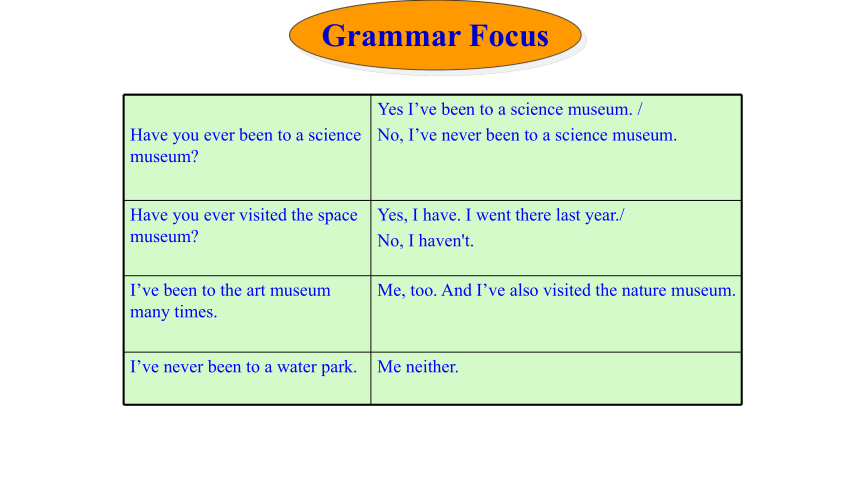
文档简介
课件37张PPT。Unit 9
Have you ever been to a museum?Section A Grammar FocusHave you read these books?Summer vacation is coming,Have you ever been to the Great Wall ?
Yes I have. /No, I haven’t.//No, never.你曾经去过…吗?Have you ever been to Hainan Island?
Yes, I have./No, I haven’t./No, never.zooHave you ever been to …?
Yes, I have. / No, I haven’t. /No, never.space museumHave you ever been to …?
Yes, I have. / No, I haven’t. /No, never.water parkHave you ever been to …?
Yes, I have. / No, I haven’t. /No, never.ThailandHave you ever been to Thailand?
Yes, I have. / No, I haven’t./No, never.Amusement
parkHave you ever been to …?
Yes, I have. / No, I haven’t. /No, never.Grammar Focus
现在完成时由主语+have/has+过去分词构成。
其主要用法如下:Grammar Focus结构: 主语+ have / has + 动词的过去分词一般疑问句: have / has … ?
Yes, I have. No, I haven’t.
Yes, she has. No, she hasn’t. Review 现在完成时表示过去发生或完成的某一动作对现在造成的影响或结果。
如:Have?you?read?that?story?你读过那个故事吗?(“读”这一动作发生在过去,对现在造成的影响是:是否知道故事的内容。)???
I?have?bought?two?apples.?我买了两个苹果。?(“买”这一动作发生在过去,对现在造成的结果是:拥有两个苹果。)?1. 在现在完成时中?ever,?never,?just,?already,?yet在用法和意思上有什么区别??在学习这一概念的同时,还应注意常与现在完成时连用的几个副词:already, just, ever, yet, never等。already, just多用于肯定句中,ever, yet, never多用于疑问句和否定句中。
如:I?have?already?finished?my?homework.
我已经做完家庭作业了。???
He?has?just?had?his?meal.他刚吃过饭。
Have?you?ever?sung?this?English?song?
你曾唱过这首英文歌吗????
They?haven‘t?started?yet. 他们还没有身。???
We?have?never?heard?of?it.
我们从来没有听说过这件事。(1).?Have (has)?been?in?意为“已经在某地呆了多长时间”,常与表示一段时间的状语连用。
Mr.?Brown?has?been?in?Shanghai?for?three?days.?布朗先生来上海已经有三天了。???
They?have?been?in?Canada?for?five?years.?
他们到加拿大有五年了。???2. have?been?in,?have?been?to?与have?gone?to?
的用法???(2).?Have (has)?been?to 意为“曾经去过某地”,表示现在已经不在那里了。可与 just,?ever,?
never 等连用。
如:I’ve?just?been?to?the?post?office.?
我刚才去邮局了。???
Have?you?ever?been?to?Hangzhou??
你曾经去过杭州吗?
Mary?has?never?been?to?the?Great?Wall.?
玛丽从未去过长城。???(3).?Have (has)?been?to?后面可接次数,
表示去过某地几次。
如:I've?been?to?Beijing?three?times.?
我去过北京三次。???
They?have?been?to?that?village?several?times.?
他们去过那个村庄好几次了。
(4).?Have (has)?gone?to?意为“到某地去了”,表示到了某地或正在去某地的途中。总之,说话时该人不在现场,一般不用第一、二人称代词作主语。
如: —Where?is?Tom??汤姆在哪里???
—He?has?gone?to?the?bookshop. 他到书店去了。例如:
He has gone to Hong Kong.
他到香港去了。(他已前往香港, 或在途中,
或已到达。说话人暗示他现在不在现场)
He has been to Hong Kong. 他曾到过香港。
(说话人认为他过去到过香港, 现在已不在该地。
言外之意他对香港有所了解)
1 have / has been to +地名
去过某地(去过已回来);
2 have / has gone to +地名
去了某地(还没回来);
3 have / has been in +地名
在某地住了有多长。 Have been to / in 和 have gone to的区别SummaryA: Have you ever been to the Great Wall?
B:Yes, I have. What about you?
A: Me too.
=So have I.
=I have ever been there, too.
So+助动词/be动词/情态动词+主语.A: Have you ever been to the Great Wall?
B: No, I haven’t. What about you?
A: Me neither.
=Neither have I.
=I haven’t been there, either.
Neither+助动词/be动词/情态动词+主语. neither have I = me neither .
I have been to the zoo a lot of times. 答语______________ . . ( 我也是) I’ve never been to a water park. 答语____________ _______ . ( 我也没去过) 3. neither 表示“两者都不, 两者中没有一个”,
是both的完全否定形式。either 表示“两者之一,
两者中任一个”, 还可以用于否定句中表示“也”,
这种用法与肯定句中的too相对应。如:
Neither of the twins likes swimming.
那对双胞胎都不喜欢游泳。
Neither my sister or I am have ever been abroad.
我和我姐姐都没出过国。
My sister has never been abroad. I haven’t, either.
我姐姐没出过国, 我也没有。neither还可以用于完全倒装句中, 表示“也没
有……”。这种用法和so在完全倒装句中
表示“也……”的用法相对应。如:
My sister has never been abroad. Neither have I.
我姐姐没出过国, 我也没有。
Lily likes playing the piano. So has her brother.
Lily喜欢弹钢琴, 她弟弟也喜欢。
I am not new here. Neither is Tom.
我不是新来的, Tom也不是。4. 注意区别so在完全倒装句和不完全倒装句中
的用法。
so+助动词+主语 完全倒装, 表示“也……”
so+主语+助动词 不完全倒装, 表示“确实如此”
如: Mary has gone to Singapore. So has Emily.
Mary去新加坡了, Emily也去了。
-- Dracula likes spicy food.
-- So he does.
-- Dracula喜欢吃辣的。
-- 是的, 确实如此。1. A: Do you want __________ (come) to the
space museum?
B: No, I’ve already ______ (be) there three times.
2. A: Have you ________ (see) the robots at the
science museum?
B: Yes, I ______ (go) there last weekend.4a. Put the correct forms of the verbs in the blanks.to comebeenseenwent3. A: Let’s ________ (spend) the day at the zoo.
B: Well, I’ve already _______ (be) there a
couple of times, but I’m happy_______ (go) again.
4. A: How about _________ (go) to the art
museum? There are some special German
paintings there right now.
B: Sure. When do you want _______ (go) ?
5. A: Have you ever _________ (visit) the
history museum?
B: No, I’ve never________ (be) there.spendbeento gogoingto govisitedbeenMost of us _____________ (see) Mickey Mouse, Donald Duck and other famous Disney characters in cartoons before. But have you ever ________ (be) to Disneyland? Disneyland ______ (be) an amusement park with a special
theme —Disney characters and movies. There ______ (be) many exciting rides, lovely restaurants and fantastic gift shops there. You4b. Fill in the blanks with the correct forms of the verbs in brackets.have seenbeenisarecan also ______ (see) the Disney characters walking around the park. And have you ever
________ (hear) of a Disney Cruise? This _____ (be) a boat ride with a Disney theme. You can _______ (take) a ride on the boat for several
days and eat and sleep on it. On the boat, you can _______(shop) and have Disney parties before you _________ (arrive) at the Disney island.seeheardistakeshoparriveExerciseHe _______ (have) ever been to Shanghai.
She ________ (go) to the zoo last week.
I ________ (have) ever been to Hong Kong.
They ___________ (not have) been to the
Great Wall.
A: _________ (have) she ever been to China?
B: Yes, she ________ (go) there in 1989.haswenthavehaven’tHaswent1. --_____ you ever _____ to a water park?
--Yes, we had a good time there.
A. Have, gone B. Had, been
C. Have, been
2. I _____ my grandpa last Sunday.
A. have visited B. visited C. was visiting
3. She _____ Shanghai for a month.
A. has come to B. came to C. has been in单项选择C B C 4. Lu Xun _____ more than fifty years ago.
A. died B. has died C. has been dead
5. Fanny _____ TV at this time last Saturday.
A. has watched B. was watching
C. watched
6. --Have you ____ been to our town before?
--No, it's the first time I ____ here.
A. even, have come B. ever, come
C. ever, have comeAB C 1. 你曾经去过水上公园吗?
______ you ever _______ ____ the water park?没有。No, ___ ________.
我也没有。___________________.
2. He has been to America.
(1) 一般疑问句 ____ he _____ to America?
Yes, _______ ________.
(2) 否定句 He ______ ______ to America .按要求补充句子。Have been to I haven’t Me neither Has been he has hasn’t been 3. 1) Have you ______ there?
A. been to B. gone to C. been D. gone
2) Lucy isn’t at home now. She ______ _______ _______ the USA.
3) My father _____________Shanghai for 8 days.
4)I____ (clean ) the window yesterday.
5) I ______already ________ (clean ) the window. Chasgone tohas been in cleanedhave cleaned1. 用Have you ever been to …? 造句并回答
(三组) 。
2. 4c. Answer the survey questions and then ask
your partner.
Homework Thank You!
Have you ever been to a museum?Section A Grammar FocusHave you read these books?Summer vacation is coming,Have you ever been to the Great Wall ?
Yes I have. /No, I haven’t.//No, never.你曾经去过…吗?Have you ever been to Hainan Island?
Yes, I have./No, I haven’t./No, never.zooHave you ever been to …?
Yes, I have. / No, I haven’t. /No, never.space museumHave you ever been to …?
Yes, I have. / No, I haven’t. /No, never.water parkHave you ever been to …?
Yes, I have. / No, I haven’t. /No, never.ThailandHave you ever been to Thailand?
Yes, I have. / No, I haven’t./No, never.Amusement
parkHave you ever been to …?
Yes, I have. / No, I haven’t. /No, never.Grammar Focus
现在完成时由主语+have/has+过去分词构成。
其主要用法如下:Grammar Focus结构: 主语+ have / has + 动词的过去分词一般疑问句: have / has … ?
Yes, I have. No, I haven’t.
Yes, she has. No, she hasn’t. Review 现在完成时表示过去发生或完成的某一动作对现在造成的影响或结果。
如:Have?you?read?that?story?你读过那个故事吗?(“读”这一动作发生在过去,对现在造成的影响是:是否知道故事的内容。)???
I?have?bought?two?apples.?我买了两个苹果。?(“买”这一动作发生在过去,对现在造成的结果是:拥有两个苹果。)?1. 在现在完成时中?ever,?never,?just,?already,?yet在用法和意思上有什么区别??在学习这一概念的同时,还应注意常与现在完成时连用的几个副词:already, just, ever, yet, never等。already, just多用于肯定句中,ever, yet, never多用于疑问句和否定句中。
如:I?have?already?finished?my?homework.
我已经做完家庭作业了。???
He?has?just?had?his?meal.他刚吃过饭。
Have?you?ever?sung?this?English?song?
你曾唱过这首英文歌吗????
They?haven‘t?started?yet. 他们还没有身。???
We?have?never?heard?of?it.
我们从来没有听说过这件事。(1).?Have (has)?been?in?意为“已经在某地呆了多长时间”,常与表示一段时间的状语连用。
Mr.?Brown?has?been?in?Shanghai?for?three?days.?布朗先生来上海已经有三天了。???
They?have?been?in?Canada?for?five?years.?
他们到加拿大有五年了。???2. have?been?in,?have?been?to?与have?gone?to?
的用法???(2).?Have (has)?been?to 意为“曾经去过某地”,表示现在已经不在那里了。可与 just,?ever,?
never 等连用。
如:I’ve?just?been?to?the?post?office.?
我刚才去邮局了。???
Have?you?ever?been?to?Hangzhou??
你曾经去过杭州吗?
Mary?has?never?been?to?the?Great?Wall.?
玛丽从未去过长城。???(3).?Have (has)?been?to?后面可接次数,
表示去过某地几次。
如:I've?been?to?Beijing?three?times.?
我去过北京三次。???
They?have?been?to?that?village?several?times.?
他们去过那个村庄好几次了。
(4).?Have (has)?gone?to?意为“到某地去了”,表示到了某地或正在去某地的途中。总之,说话时该人不在现场,一般不用第一、二人称代词作主语。
如: —Where?is?Tom??汤姆在哪里???
—He?has?gone?to?the?bookshop. 他到书店去了。例如:
He has gone to Hong Kong.
他到香港去了。(他已前往香港, 或在途中,
或已到达。说话人暗示他现在不在现场)
He has been to Hong Kong. 他曾到过香港。
(说话人认为他过去到过香港, 现在已不在该地。
言外之意他对香港有所了解)
1 have / has been to +地名
去过某地(去过已回来);
2 have / has gone to +地名
去了某地(还没回来);
3 have / has been in +地名
在某地住了有多长。 Have been to / in 和 have gone to的区别SummaryA: Have you ever been to the Great Wall?
B:Yes, I have. What about you?
A: Me too.
=So have I.
=I have ever been there, too.
So+助动词/be动词/情态动词+主语.A: Have you ever been to the Great Wall?
B: No, I haven’t. What about you?
A: Me neither.
=Neither have I.
=I haven’t been there, either.
Neither+助动词/be动词/情态动词+主语. neither have I = me neither .
I have been to the zoo a lot of times. 答语______________ . . ( 我也是) I’ve never been to a water park. 答语____________ _______ . ( 我也没去过) 3. neither 表示“两者都不, 两者中没有一个”,
是both的完全否定形式。either 表示“两者之一,
两者中任一个”, 还可以用于否定句中表示“也”,
这种用法与肯定句中的too相对应。如:
Neither of the twins likes swimming.
那对双胞胎都不喜欢游泳。
Neither my sister or I am have ever been abroad.
我和我姐姐都没出过国。
My sister has never been abroad. I haven’t, either.
我姐姐没出过国, 我也没有。neither还可以用于完全倒装句中, 表示“也没
有……”。这种用法和so在完全倒装句中
表示“也……”的用法相对应。如:
My sister has never been abroad. Neither have I.
我姐姐没出过国, 我也没有。
Lily likes playing the piano. So has her brother.
Lily喜欢弹钢琴, 她弟弟也喜欢。
I am not new here. Neither is Tom.
我不是新来的, Tom也不是。4. 注意区别so在完全倒装句和不完全倒装句中
的用法。
so+助动词+主语 完全倒装, 表示“也……”
so+主语+助动词 不完全倒装, 表示“确实如此”
如: Mary has gone to Singapore. So has Emily.
Mary去新加坡了, Emily也去了。
-- Dracula likes spicy food.
-- So he does.
-- Dracula喜欢吃辣的。
-- 是的, 确实如此。1. A: Do you want __________ (come) to the
space museum?
B: No, I’ve already ______ (be) there three times.
2. A: Have you ________ (see) the robots at the
science museum?
B: Yes, I ______ (go) there last weekend.4a. Put the correct forms of the verbs in the blanks.to comebeenseenwent3. A: Let’s ________ (spend) the day at the zoo.
B: Well, I’ve already _______ (be) there a
couple of times, but I’m happy_______ (go) again.
4. A: How about _________ (go) to the art
museum? There are some special German
paintings there right now.
B: Sure. When do you want _______ (go) ?
5. A: Have you ever _________ (visit) the
history museum?
B: No, I’ve never________ (be) there.spendbeento gogoingto govisitedbeenMost of us _____________ (see) Mickey Mouse, Donald Duck and other famous Disney characters in cartoons before. But have you ever ________ (be) to Disneyland? Disneyland ______ (be) an amusement park with a special
theme —Disney characters and movies. There ______ (be) many exciting rides, lovely restaurants and fantastic gift shops there. You4b. Fill in the blanks with the correct forms of the verbs in brackets.have seenbeenisarecan also ______ (see) the Disney characters walking around the park. And have you ever
________ (hear) of a Disney Cruise? This _____ (be) a boat ride with a Disney theme. You can _______ (take) a ride on the boat for several
days and eat and sleep on it. On the boat, you can _______(shop) and have Disney parties before you _________ (arrive) at the Disney island.seeheardistakeshoparriveExerciseHe _______ (have) ever been to Shanghai.
She ________ (go) to the zoo last week.
I ________ (have) ever been to Hong Kong.
They ___________ (not have) been to the
Great Wall.
A: _________ (have) she ever been to China?
B: Yes, she ________ (go) there in 1989.haswenthavehaven’tHaswent1. --_____ you ever _____ to a water park?
--Yes, we had a good time there.
A. Have, gone B. Had, been
C. Have, been
2. I _____ my grandpa last Sunday.
A. have visited B. visited C. was visiting
3. She _____ Shanghai for a month.
A. has come to B. came to C. has been in单项选择C B C 4. Lu Xun _____ more than fifty years ago.
A. died B. has died C. has been dead
5. Fanny _____ TV at this time last Saturday.
A. has watched B. was watching
C. watched
6. --Have you ____ been to our town before?
--No, it's the first time I ____ here.
A. even, have come B. ever, come
C. ever, have comeAB C 1. 你曾经去过水上公园吗?
______ you ever _______ ____ the water park?没有。No, ___ ________.
我也没有。___________________.
2. He has been to America.
(1) 一般疑问句 ____ he _____ to America?
Yes, _______ ________.
(2) 否定句 He ______ ______ to America .按要求补充句子。Have been to I haven’t Me neither Has been he has hasn’t been 3. 1) Have you ______ there?
A. been to B. gone to C. been D. gone
2) Lucy isn’t at home now. She ______ _______ _______ the USA.
3) My father _____________Shanghai for 8 days.
4)I____ (clean ) the window yesterday.
5) I ______already ________ (clean ) the window. Chasgone tohas been in cleanedhave cleaned1. 用Have you ever been to …? 造句并回答
(三组) 。
2. 4c. Answer the survey questions and then ask
your partner.
Homework Thank You!
同课章节目录
- Unit 1 What's the matter?
- Section A
- Section B
- Unit 2 I'll help to clean up the city parks.
- Section A
- Section B
- Unit 3 Could you please clean your room?
- Section A
- Section B
- Unit 4 Why don't you talk to your parents?
- Section A
- Section B
- Unit 5 What were you doing when the rainstorm came
- Section A
- Section B
- Review of Units 1-5
- Unit 6 An old man tried to move the mountains.
- Section A
- Section B
- Unit 7 What's the highest mountain in the world?
- Section A
- Section B
- Unit 8 Have you read Treasure Island yet?
- Section A
- Section B
- Unit 9 Have you ever been to a museum?
- Section A
- Section B
- Unit 10 I've had this bike for three years.
- Section A
- Section B
